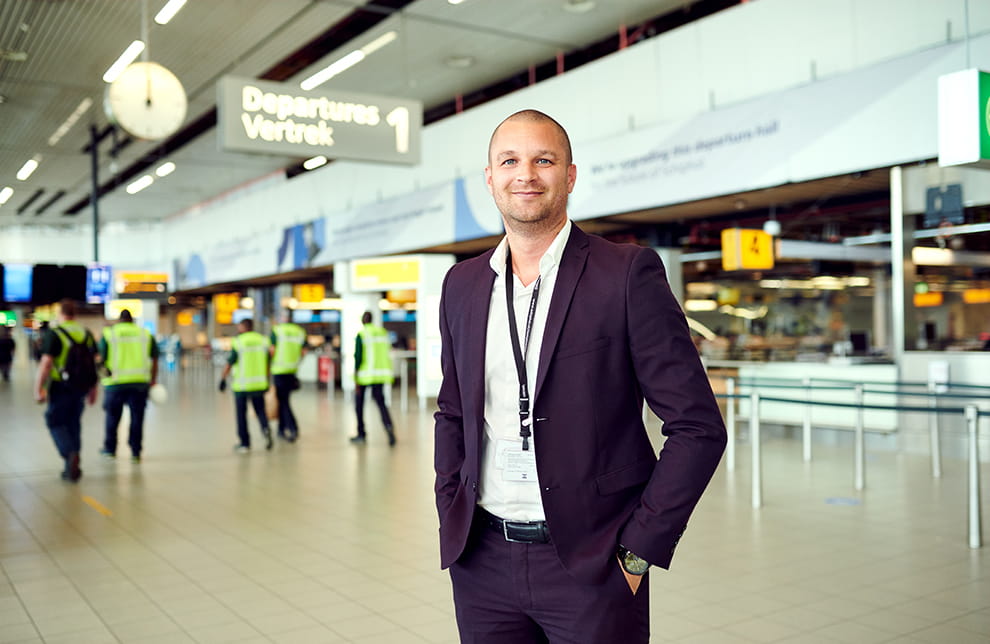Interview Ronald Pronk: Opportunities and challenges in the corona crisis
Published on: 3 July 2020
The start of the lockdown in the Netherlands was a bit of a shock for Ronald Pronk, the project manager of VolkerWessels Bouw Schiphol for the Redevelopment of Departure and Lounge 1 (HT1). ‘As construction projects go, this one is very time-sensitive and performance-driven. When speaking with colleagues, I like to call it a construction project for the Champions League. “What kinds of challenges will we have to deal with now?” was my first thought.’

The Terminal 1 (HT1) project already entailed significant challenges, even before the lockdown. Ronald says: ‘This project involved not only our team of 50 to 60 people – including engineers, planners and supervisors – and dozens of subcontractors, but also a whole range of stakeholders such as KLM and various Schiphol business units, including Operations and Security. That made it tricky from the beginning.
Moreover, before the lockdown we had to deal with the daily operation of passenger flows at Schiphol and all of the wishes and requirements that go along with it. For example, you can’t simply close off an important stairway and lift that thousands of people use every day. This meant that we could only work a few hours at night in some locations, while still being bound to tight schedules.’
The lockdown
So the lockdown was a godsend for this project? ‘At first you think: what on earth is happening now? What about all the uncertainties? With projects that are as time-sensitive and performance-driven as this one, it’s really inconvenient if staff become ill or supplies get delayed. Many deliveries come from abroad, from Sweden, Germany, Italy and even China. In the end, everything worked out surprisingly well, despite warnings from suppliers that delays were possible. The crisis had already peaked in some countries, so deliveries resumed.’
All hands on deck
The Terminal 1 project called for all hands on deck when the lockdown was announced. ‘From one day to the next, 35 to 40 members of our team suddenly started working from home. Things were a little hectic from day one: how are we going to reach everyone so that everyone stays informed, has the right information and we can keep the project moving along?’
Online meetings
‘We immediately set up an online meeting with the Schiphol team that took place every other day. That was crucial in the early phase. After all, you can no longer pop in to chat with your colleagues, but everyone still has to stay up-to-date and on top of developments.’ He laughs: ‘I think, and I’m not alone in this, that we even started to work a little more efficiently during the online meetings.’
‘During in-person meetings you often jump from one topic to another, many people speak at once and you tend to lose some of the structure. But you have to maintain structure in online meetings, because they are simply more intense. Moreover, you can’t all speak at once. It just doesn’t work. So we drew up a set of guidelines for meeting structure and etiquette.’
‘For example, everyone mutes their microphone at the start of the meeting. If you want to say something, you raise your hand. In the end, I noticed that everyone was better prepared, that everyone listed more closely and that issues got settled faster. Our experience with online meetings has been overwhelmingly positive, both internally and externally.’
Workplace safety
The workplace also saw a number of changes. ‘We are following the guidelines of RIVM and Bouwend Nederland, the industry association. In order to keep the workplace safe, we immediately split the 100 workers into two groups, and we sent half home. Half now work in the evening, the other half during the day. Workers wear face masks when working in small spaces. They also take breaks in double shifts.’
Smoother and faster
‘Looking back, I think we changed gears smoothly in the first week of the lockdown. For example, management conducted an analysis of each area to see how stakeholders would respond during the lockdown and whether we could take advantage of this to move the project along even smoother and faster. Will KLM keep flying, for example, and will passengers keep coming?
The lockdown meant no more passengers in the KLM Business Class Lounge. So we almost immediately ramped up work there from two to four hours at night, and from eight to twelve hours during the day. After all, we weren’t bothering anybody. The same went for the main ascent/descent point from Plaza to Departure Hall 1: it could be closed down so we could work. The airport was expected to reopen on 1 June. We saw a challenge here: get the work done by that date. We did it!’
Proud of teamwork
‘I can honestly say that I’m immensely proud of everything we have achieved over the past few months, of the teamwork we have shown. It was already there, of course, but the coronavirus crisis really made our teamwork shine. Where possible, we also seized opportunities by speeding up our work to reduce backlogs, enabling us to keep to the original schedule.
The crisis also provided us with new insights: previously, everyone involved in the project travelled in by car. We have now seen that online meetings are a viable alternative, and we plan to continue with these digital encounters.’